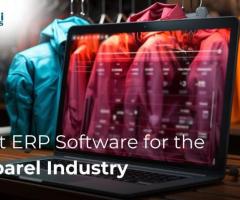In the fast-paced and highly competitive world of fashion, efficiency, agility, and precision are paramount. Apparel companies must navigate complex supply chains, manage diverse product lines, and respond swiftly to changing market trends. In this landscape, Enterprise Resource Planning (ERP) systems tailored for the apparel industry are indispensable tools for success.
At the heart of ERP solutions for the apparel industry lies comprehensive integration. These systems seamlessly integrate various functions such as inventory management, production planning, order processing, supply chain management, and financials into a single cohesive platform. This integration eliminates silos, enhances visibility across t...
In the fast-paced and highly competitive world of fashion, efficiency, agility, and precision are paramount. Apparel companies must navigate complex supply chains, manage diverse product lines, and respond swiftly to changing market trends. In this landscape, Enterprise Resource Planning (ERP) systems tailored for the apparel industry are indispensable tools for success.
At the heart of ERP solutions for the apparel industry lies comprehensive integration. These systems seamlessly integrate various functions such as inventory management, production planning, order processing, supply chain management, and financials into a single cohesive platform. This integration eliminates silos, enhances visibility across the entire value chain, and facilitates data-driven decision-making.
One of the key challenges in the apparel industry is managing the intricacies of product lifecycle management. ERP solutions address this challenge by providing robust functionality for product development, including design, sampling, and prototyping. With streamlined processes and centralized data, apparel companies can accelerate time-to-market, reduce costs, and ensure product quality and compliance with regulatory standards.
Supply chain management is another critical aspect where ERP systems play a pivotal role. Apparel companies often source materials and components from various suppliers across the globe. ERP solutions enable seamless collaboration with suppliers, from procurement and vendor management to logistics and inventory control. Real-time visibility into inventory levels, lead times, and production schedules empowers companies to optimize inventory levels, minimize stockouts, and mitigate supply chain risks.
Moreover, ERP solutions for the apparel industry incorporate advanced forecasting and demand planning capabilities. By analyzing historical sales data, market trends, and seasonality, these systems help companies accurately forecast demand, plan production schedules, and optimize inventory levels. This proactive approach enables apparel companies to meet customer demand while minimizing excess inventory and markdowns.
In addition to operational efficiency, ERP solutions for the apparel industry empower companies with actionable insights through advanced analytics and reporting capabilities. By consolidating data from disparate sources into a centralized repository, these systems provide executives and managers with real-time visibility into key performance indicators (KPIs), such as sales performance, production efficiency, and inventory turnover. Armed with these insights, decision-makers can identify trends, detect opportunities, and address challenges proactively.
Furthermore, ERP solutions for the apparel industry are adaptable and scalable to accommodate the evolving needs of businesses. Whether a startup or a multinational corporation, apparel companies can customize ERP systems to align with their unique processes, workflows, and business requirements. Moreover, as businesses grow and expand into new markets, ERP solutions scale seamlessly to support increased transaction volumes, additional users, and extended functionalities.
In conclusion, ERP solutions are indispensable tools for apparel companies seeking to thrive in today's dynamic and competitive landscape. By streamlining operations, enhancing visibility, and providing actionable insights, these systems empower apparel companies to accelerate growth, improve customer satisfaction, and stay ahead of the curve in the ever-evolving fashion industry.



